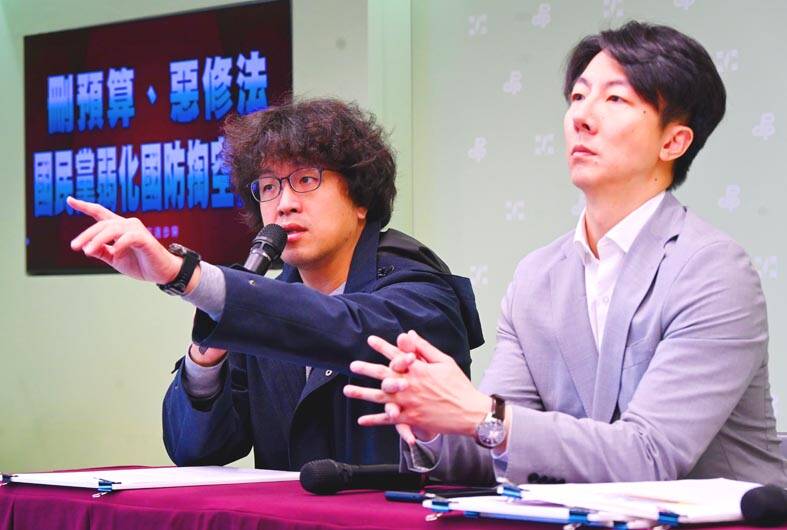Lawmakers from the Democratic Progressive Party (DPP) have accused their counterparts from the Chinese Nationalist Party (KMT) of weakening national security, following proposed budget cuts to the submarine program and draft amendments to the Civil Defense Act (民防法).
DPP spokesman Justin Wu (吳崢) and legislators Michelle Lin (林楚茵) and Puma Shen (沈伯洋) held a news conference yesterday to discuss concerns about the proposals that they said could undermine national security goals.
Taiwan’s defense has serious challenges, Wu said, adding that KMT legislators Ma Wen-chun (馬文君), Huang Jen (黃仁) and Hsu Chiao-hsin (徐巧芯) blocked funding for construction of domestic submarines.

Photo: Liu Hsin-de, Taipei Times
The total submarine budget for the next 14 years is NT$28.4 billion (US$873 million), with the budget for next year set at NT$1.9 billion.
However, Hsu proposed a budget cut of NT$1.7 billion for next year, leaving just NT$200 million, while Ma and Huang proposed cutting the budget entirely.
China’s military activities near Taiwan’s airspace have increased in frequency, but the KMT has not allowed for Taiwan to strengthen its defensive capabilities since the Chen Shui-bian administration (陳水扁), Wu said.
During the administration of former president Tsai Ing-wen (蔡英文), the government prioritized domestic submarine construction, but the KMT has repeatedly blocked those plans through budget freezes and proposed cuts, he said.
National defense requires unity, just as Taiwanese showed unity when cheering for “Team Taiwan” — the national baseball team who won the World Baseball Softball Confederation’s Premier12 championship in Tokyo this weekend, Lin said.
Comparing the budget for next year to a deposit on purchasing a home, Lin said that if the proposed budget cuts go through, it would announce to the world that Taiwan is abandoning its submarine program.
That behavior only benefits the Chinese Communist Party (CCP), she said, adding that the KMT should consider whether it wants to be the CPP’s “local collaborator” or support Taiwan instead.
Shen compared Taiwan’s national defense to winning a baseball championship — the frontline armed forces, the civil defense systems, and the people’s self-defense determination must all come together to achieve success.
By cutting the submarine budget and amending the Civil Defense Act and All-out Defense Mobilization Readiness Act (全民防衛動員準備法), the KMT undermines Taiwan’s frontline defense systems, reduces its logistical support and weakens the ability for citizens to participate in its defense, Shen said.
Recent actions by the KMT, including the proposed changes to the Constitutional Court and Officials Election and Recall Act (公職人員選舉罷免法), “hollow out” the country, Shen added.

The manufacture of the remaining 28 M1A2T Abrams tanks Taiwan purchased from the US has recently been completed, and they are expected to be delivered within the next one to two months, a source said yesterday. The Ministry of National Defense is arranging cargo ships to transport the tanks to Taiwan as soon as possible, said the source, who is familiar with the matter. The estimated arrival time ranges from late this month to early next month, the source said. The 28 Abrams tanks make up the third and final batch of a total of 108 tanks, valued at about NT$40.5 billion

Two Taiwanese prosecutors were questioned by Chinese security personnel at their hotel during a trip to China’s Henan Province this month, the Mainland Affairs Council (MAC) said yesterday. The officers had personal information on the prosecutors, including “when they were assigned to their posts, their work locations and job titles,” MAC Deputy Minister and spokesman Liang Wen-chieh (梁文傑) said. On top of asking about their agencies and positions, the officers also questioned the prosecutors about the Cross-Strait Joint Crime-Fighting and Judicial Mutual Assistance Agreement, a pact that serves as the framework for Taiwan-China cooperation on combating crime and providing judicial assistance, Liang

A group from the Taiwanese Designers in Australia association yesterday represented Taiwan at the Midsumma Pride March in Melbourne. The march, held in the St. Kilda suburb, is the city’s largest LGBTQIA+ parade and the flagship event of the annual Midsumma Festival. It attracted more than 45,000 spectators who supported the 400 groups and 10,000 marchers that participated this year, the association said. Taiwanese Designers said they organized a team to march for Taiwan this year, joining politicians, government agencies, professionals and community organizations in showing support for LGBTQIA+ people and diverse communities. As the first country in Asia to legalize same-sex

MOTIVES QUESTIONED The PLA considers Xi’s policies toward Taiwan to be driven by personal considerations rather than military assessment, the Epoch Times reports Chinese President Xi Jinping’s (習近平) latest purge of the Chinese People’s Liberation Army (PLA) leadership might have been prompted by the military’s opposition to plans of invading Taiwan, the Epoch Times said. The Chinese military opposes waging war against Taiwan by a large consensus, putting it at odds with Xi’s vision, the Falun Gong-affiliated daily said in a report on Thursday, citing anonymous sources with insight into the PLA’s inner workings. The opposition is not the opinion of a few generals, but a widely shared view among the PLA cadre, the Epoch Times cited them as saying. “Chinese forces know full well that